The Evolution of Management Practice Before the Industrial Revolution
VerifiedAdded on 2022/12/28
|9
|2681
|50
Essay
AI Summary
This essay comprehensively examines the evolution of management practices, focusing on the period before the industrial revolution. It explores the rudimentary forms of organization and leadership that existed, highlighting how early societies managed resources and work. The essay contrasts these practices with the developments during and after the industrial revolution, detailing how the factory system, technological advancements, and changing economic landscapes reshaped management theories and techniques. It discusses the emergence of scientific, classical, neo-classical, and modern management theories and their impact on organizational structures, employee relations, and overall business performance. Furthermore, the essay analyzes the growing sophistication of management practices in the post-industrial era, emphasizing the shift towards open management styles, employee involvement, and performance monitoring, along with the adoption of benchmarking and advanced technologies. The paper provides a historical overview of the evolution of management, tracing the significant transitions and their implications for modern business practices.
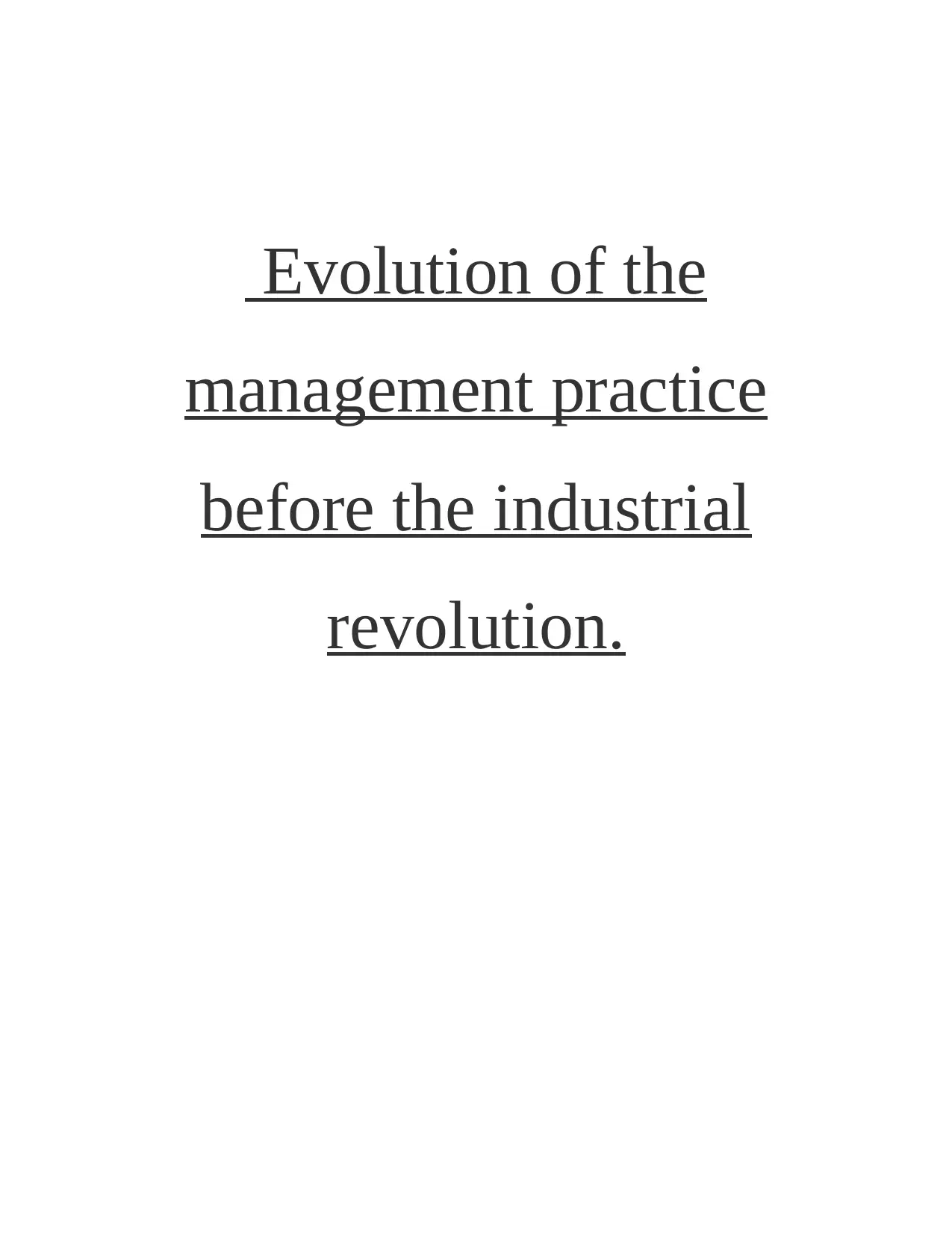
Evolution of the
management practice
before the industrial
revolution.
management practice
before the industrial
revolution.
Paraphrase This Document
Need a fresh take? Get an instant paraphrase of this document with our AI Paraphraser

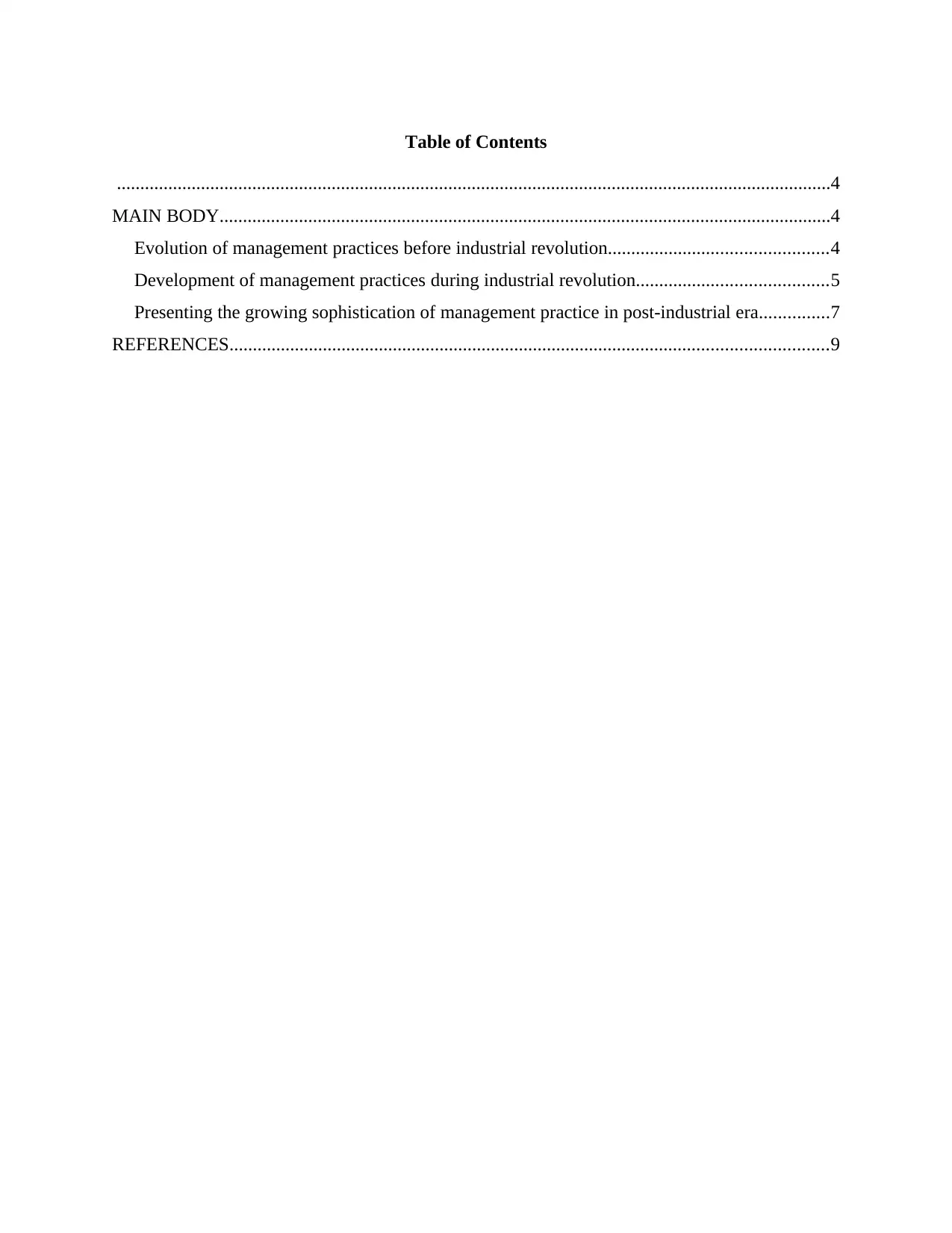
Table of Contents
.........................................................................................................................................................4
MAIN BODY...................................................................................................................................4
Evolution of management practices before industrial revolution...............................................4
Development of management practices during industrial revolution.........................................5
Presenting the growing sophistication of management practice in post-industrial era...............7
REFERENCES................................................................................................................................9
.........................................................................................................................................................4
MAIN BODY...................................................................................................................................4
Evolution of management practices before industrial revolution...............................................4
Development of management practices during industrial revolution.........................................5
Presenting the growing sophistication of management practice in post-industrial era...............7
REFERENCES................................................................................................................................9
⊘ This is a preview!⊘
Do you want full access?
Subscribe today to unlock all pages.

Trusted by 1+ million students worldwide
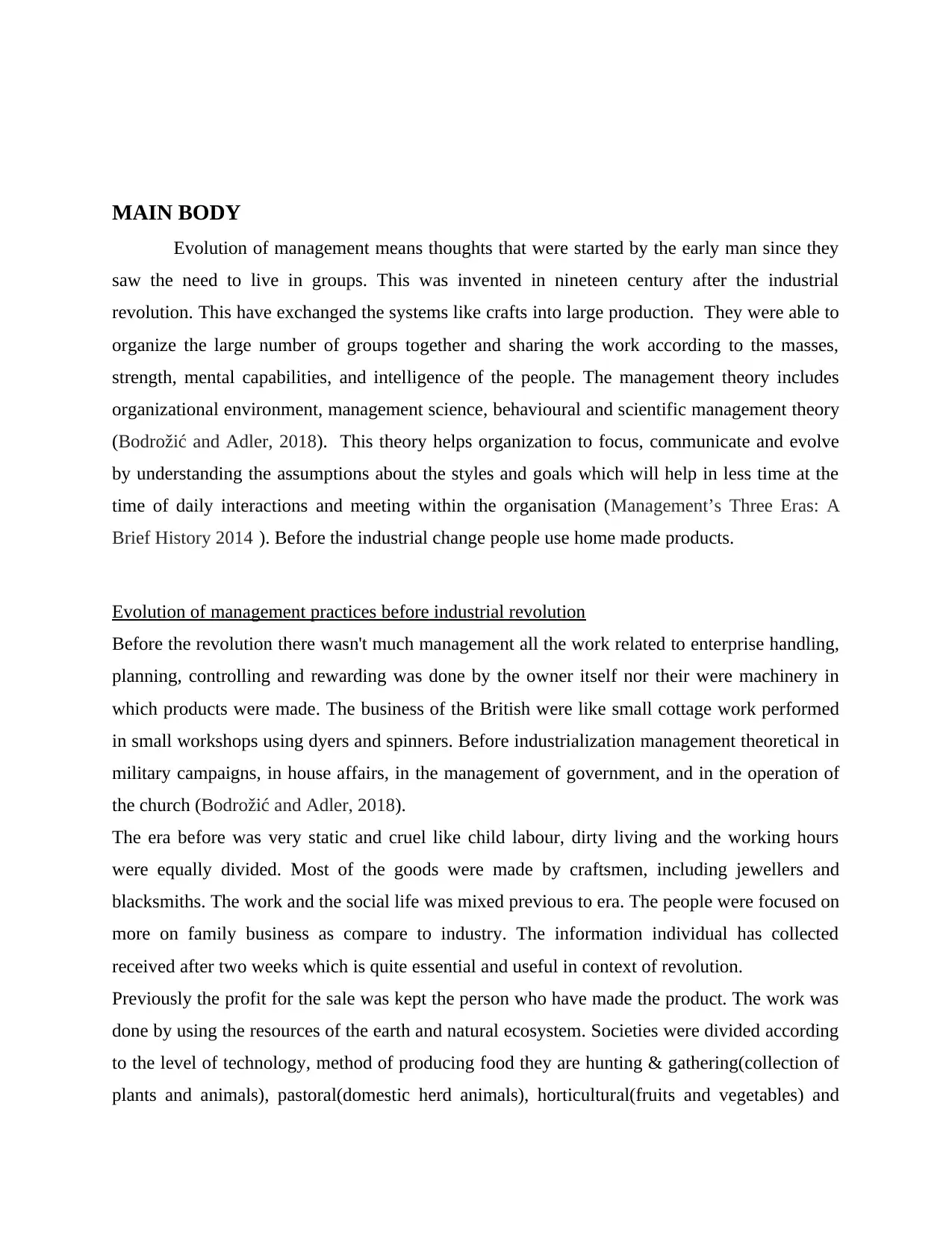
MAIN BODY
Evolution of management means thoughts that were started by the early man since they
saw the need to live in groups. This was invented in nineteen century after the industrial
revolution. This have exchanged the systems like crafts into large production. They were able to
organize the large number of groups together and sharing the work according to the masses,
strength, mental capabilities, and intelligence of the people. The management theory includes
organizational environment, management science, behavioural and scientific management theory
(Bodrožić and Adler, 2018). This theory helps organization to focus, communicate and evolve
by understanding the assumptions about the styles and goals which will help in less time at the
time of daily interactions and meeting within the organisation (Management’s Three Eras: A
Brief History 2014 ). Before the industrial change people use home made products.
Evolution of management practices before industrial revolution
Before the revolution there wasn't much management all the work related to enterprise handling,
planning, controlling and rewarding was done by the owner itself nor their were machinery in
which products were made. The business of the British were like small cottage work performed
in small workshops using dyers and spinners. Before industrialization management theoretical in
military campaigns, in house affairs, in the management of government, and in the operation of
the church (Bodrožić and Adler, 2018).
The era before was very static and cruel like child labour, dirty living and the working hours
were equally divided. Most of the goods were made by craftsmen, including jewellers and
blacksmiths. The work and the social life was mixed previous to era. The people were focused on
more on family business as compare to industry. The information individual has collected
received after two weeks which is quite essential and useful in context of revolution.
Previously the profit for the sale was kept the person who have made the product. The work was
done by using the resources of the earth and natural ecosystem. Societies were divided according
to the level of technology, method of producing food they are hunting & gathering(collection of
plants and animals), pastoral(domestic herd animals), horticultural(fruits and vegetables) and
Evolution of management means thoughts that were started by the early man since they
saw the need to live in groups. This was invented in nineteen century after the industrial
revolution. This have exchanged the systems like crafts into large production. They were able to
organize the large number of groups together and sharing the work according to the masses,
strength, mental capabilities, and intelligence of the people. The management theory includes
organizational environment, management science, behavioural and scientific management theory
(Bodrožić and Adler, 2018). This theory helps organization to focus, communicate and evolve
by understanding the assumptions about the styles and goals which will help in less time at the
time of daily interactions and meeting within the organisation (Management’s Three Eras: A
Brief History 2014 ). Before the industrial change people use home made products.
Evolution of management practices before industrial revolution
Before the revolution there wasn't much management all the work related to enterprise handling,
planning, controlling and rewarding was done by the owner itself nor their were machinery in
which products were made. The business of the British were like small cottage work performed
in small workshops using dyers and spinners. Before industrialization management theoretical in
military campaigns, in house affairs, in the management of government, and in the operation of
the church (Bodrožić and Adler, 2018).
The era before was very static and cruel like child labour, dirty living and the working hours
were equally divided. Most of the goods were made by craftsmen, including jewellers and
blacksmiths. The work and the social life was mixed previous to era. The people were focused on
more on family business as compare to industry. The information individual has collected
received after two weeks which is quite essential and useful in context of revolution.
Previously the profit for the sale was kept the person who have made the product. The work was
done by using the resources of the earth and natural ecosystem. Societies were divided according
to the level of technology, method of producing food they are hunting & gathering(collection of
plants and animals), pastoral(domestic herd animals), horticultural(fruits and vegetables) and
Paraphrase This Document
Need a fresh take? Get an instant paraphrase of this document with our AI Paraphraser
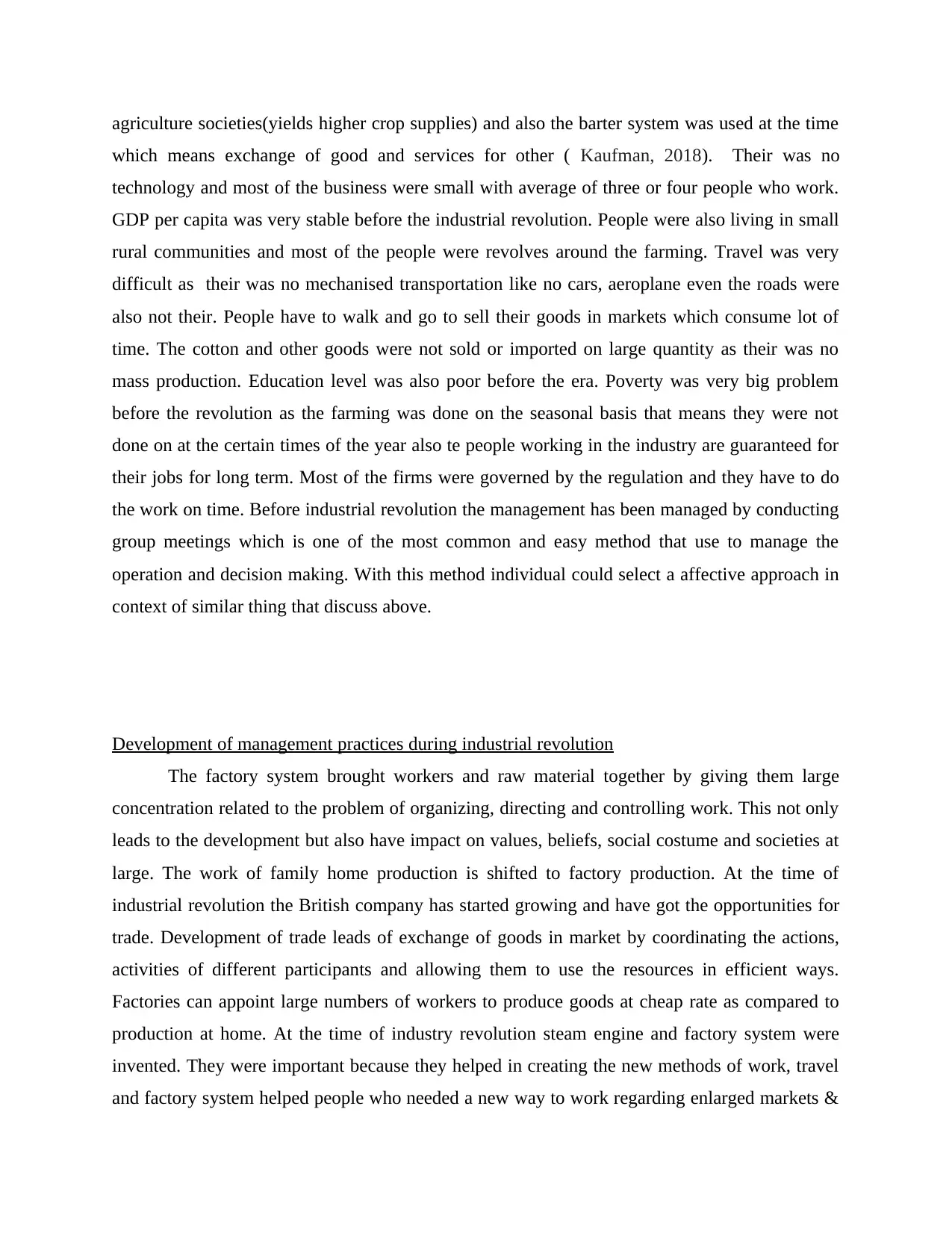
agriculture societies(yields higher crop supplies) and also the barter system was used at the time
which means exchange of good and services for other ( Kaufman, 2018). Their was no
technology and most of the business were small with average of three or four people who work.
GDP per capita was very stable before the industrial revolution. People were also living in small
rural communities and most of the people were revolves around the farming. Travel was very
difficult as their was no mechanised transportation like no cars, aeroplane even the roads were
also not their. People have to walk and go to sell their goods in markets which consume lot of
time. The cotton and other goods were not sold or imported on large quantity as their was no
mass production. Education level was also poor before the era. Poverty was very big problem
before the revolution as the farming was done on the seasonal basis that means they were not
done on at the certain times of the year also te people working in the industry are guaranteed for
their jobs for long term. Most of the firms were governed by the regulation and they have to do
the work on time. Before industrial revolution the management has been managed by conducting
group meetings which is one of the most common and easy method that use to manage the
operation and decision making. With this method individual could select a affective approach in
context of similar thing that discuss above.
Development of management practices during industrial revolution
The factory system brought workers and raw material together by giving them large
concentration related to the problem of organizing, directing and controlling work. This not only
leads to the development but also have impact on values, beliefs, social costume and societies at
large. The work of family home production is shifted to factory production. At the time of
industrial revolution the British company has started growing and have got the opportunities for
trade. Development of trade leads of exchange of goods in market by coordinating the actions,
activities of different participants and allowing them to use the resources in efficient ways.
Factories can appoint large numbers of workers to produce goods at cheap rate as compared to
production at home. At the time of industry revolution steam engine and factory system were
invented. They were important because they helped in creating the new methods of work, travel
and factory system helped people who needed a new way to work regarding enlarged markets &
which means exchange of good and services for other ( Kaufman, 2018). Their was no
technology and most of the business were small with average of three or four people who work.
GDP per capita was very stable before the industrial revolution. People were also living in small
rural communities and most of the people were revolves around the farming. Travel was very
difficult as their was no mechanised transportation like no cars, aeroplane even the roads were
also not their. People have to walk and go to sell their goods in markets which consume lot of
time. The cotton and other goods were not sold or imported on large quantity as their was no
mass production. Education level was also poor before the era. Poverty was very big problem
before the revolution as the farming was done on the seasonal basis that means they were not
done on at the certain times of the year also te people working in the industry are guaranteed for
their jobs for long term. Most of the firms were governed by the regulation and they have to do
the work on time. Before industrial revolution the management has been managed by conducting
group meetings which is one of the most common and easy method that use to manage the
operation and decision making. With this method individual could select a affective approach in
context of similar thing that discuss above.
Development of management practices during industrial revolution
The factory system brought workers and raw material together by giving them large
concentration related to the problem of organizing, directing and controlling work. This not only
leads to the development but also have impact on values, beliefs, social costume and societies at
large. The work of family home production is shifted to factory production. At the time of
industrial revolution the British company has started growing and have got the opportunities for
trade. Development of trade leads of exchange of goods in market by coordinating the actions,
activities of different participants and allowing them to use the resources in efficient ways.
Factories can appoint large numbers of workers to produce goods at cheap rate as compared to
production at home. At the time of industry revolution steam engine and factory system were
invented. They were important because they helped in creating the new methods of work, travel
and factory system helped people who needed a new way to work regarding enlarged markets &
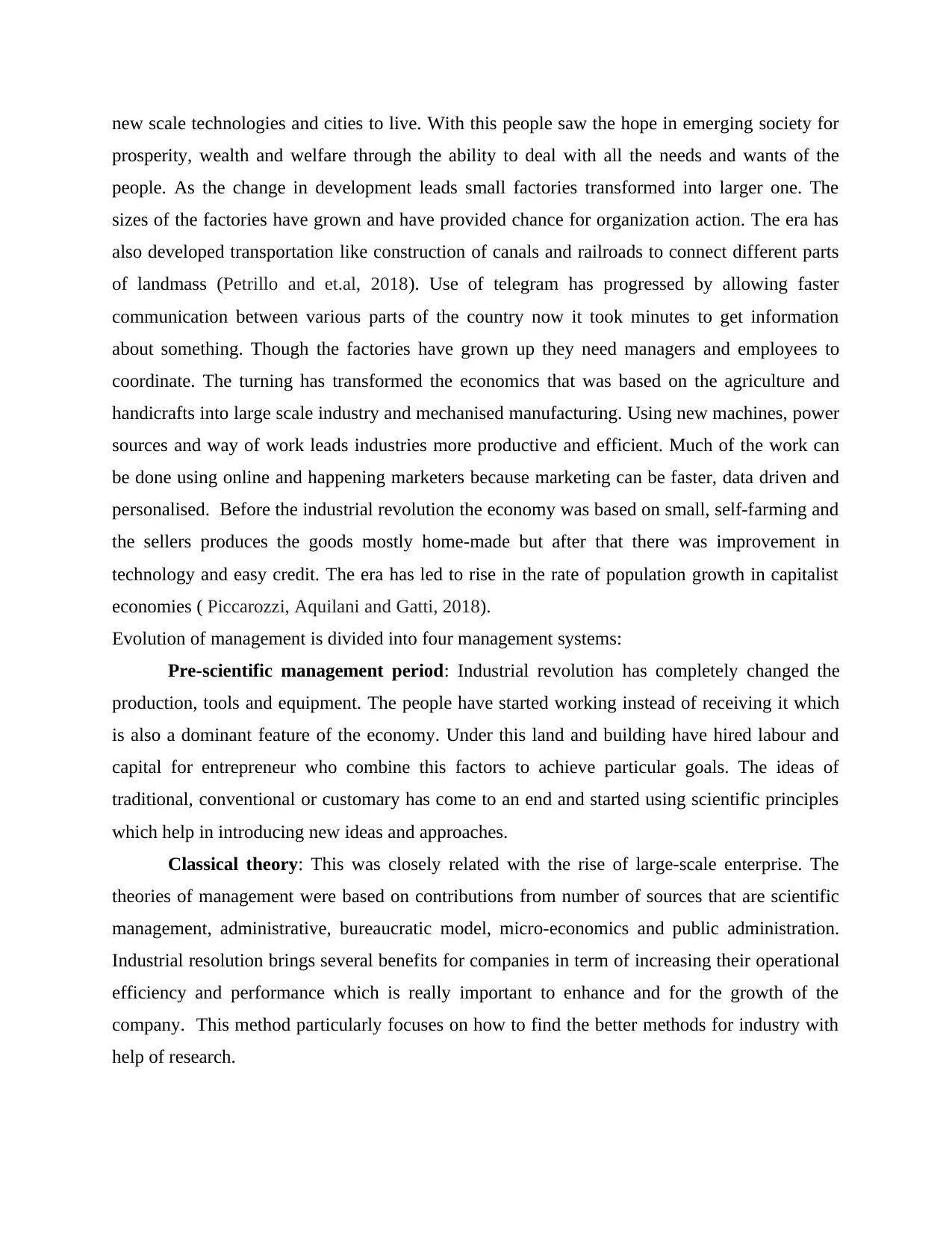
new scale technologies and cities to live. With this people saw the hope in emerging society for
prosperity, wealth and welfare through the ability to deal with all the needs and wants of the
people. As the change in development leads small factories transformed into larger one. The
sizes of the factories have grown and have provided chance for organization action. The era has
also developed transportation like construction of canals and railroads to connect different parts
of landmass (Petrillo and et.al, 2018). Use of telegram has progressed by allowing faster
communication between various parts of the country now it took minutes to get information
about something. Though the factories have grown up they need managers and employees to
coordinate. The turning has transformed the economics that was based on the agriculture and
handicrafts into large scale industry and mechanised manufacturing. Using new machines, power
sources and way of work leads industries more productive and efficient. Much of the work can
be done using online and happening marketers because marketing can be faster, data driven and
personalised. Before the industrial revolution the economy was based on small, self-farming and
the sellers produces the goods mostly home-made but after that there was improvement in
technology and easy credit. The era has led to rise in the rate of population growth in capitalist
economies ( Piccarozzi, Aquilani and Gatti, 2018).
Evolution of management is divided into four management systems:
Pre-scientific management period: Industrial revolution has completely changed the
production, tools and equipment. The people have started working instead of receiving it which
is also a dominant feature of the economy. Under this land and building have hired labour and
capital for entrepreneur who combine this factors to achieve particular goals. The ideas of
traditional, conventional or customary has come to an end and started using scientific principles
which help in introducing new ideas and approaches.
Classical theory: This was closely related with the rise of large-scale enterprise. The
theories of management were based on contributions from number of sources that are scientific
management, administrative, bureaucratic model, micro-economics and public administration.
Industrial resolution brings several benefits for companies in term of increasing their operational
efficiency and performance which is really important to enhance and for the growth of the
company. This method particularly focuses on how to find the better methods for industry with
help of research.
prosperity, wealth and welfare through the ability to deal with all the needs and wants of the
people. As the change in development leads small factories transformed into larger one. The
sizes of the factories have grown and have provided chance for organization action. The era has
also developed transportation like construction of canals and railroads to connect different parts
of landmass (Petrillo and et.al, 2018). Use of telegram has progressed by allowing faster
communication between various parts of the country now it took minutes to get information
about something. Though the factories have grown up they need managers and employees to
coordinate. The turning has transformed the economics that was based on the agriculture and
handicrafts into large scale industry and mechanised manufacturing. Using new machines, power
sources and way of work leads industries more productive and efficient. Much of the work can
be done using online and happening marketers because marketing can be faster, data driven and
personalised. Before the industrial revolution the economy was based on small, self-farming and
the sellers produces the goods mostly home-made but after that there was improvement in
technology and easy credit. The era has led to rise in the rate of population growth in capitalist
economies ( Piccarozzi, Aquilani and Gatti, 2018).
Evolution of management is divided into four management systems:
Pre-scientific management period: Industrial revolution has completely changed the
production, tools and equipment. The people have started working instead of receiving it which
is also a dominant feature of the economy. Under this land and building have hired labour and
capital for entrepreneur who combine this factors to achieve particular goals. The ideas of
traditional, conventional or customary has come to an end and started using scientific principles
which help in introducing new ideas and approaches.
Classical theory: This was closely related with the rise of large-scale enterprise. The
theories of management were based on contributions from number of sources that are scientific
management, administrative, bureaucratic model, micro-economics and public administration.
Industrial resolution brings several benefits for companies in term of increasing their operational
efficiency and performance which is really important to enhance and for the growth of the
company. This method particularly focuses on how to find the better methods for industry with
help of research.
⊘ This is a preview!⊘
Do you want full access?
Subscribe today to unlock all pages.

Trusted by 1+ million students worldwide
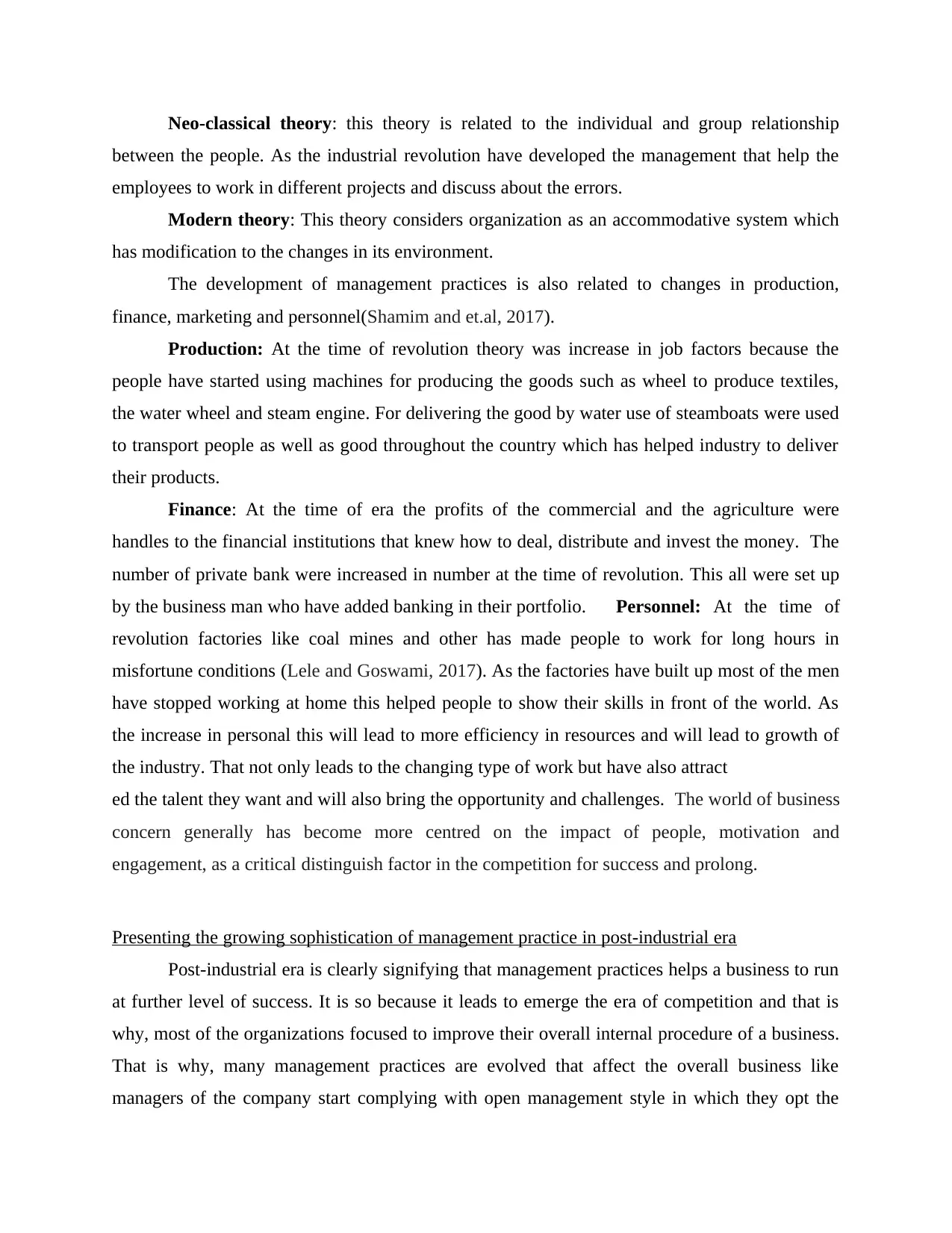
Neo-classical theory: this theory is related to the individual and group relationship
between the people. As the industrial revolution have developed the management that help the
employees to work in different projects and discuss about the errors.
Modern theory: This theory considers organization as an accommodative system which
has modification to the changes in its environment.
The development of management practices is also related to changes in production,
finance, marketing and personnel(Shamim and et.al, 2017).
Production: At the time of revolution theory was increase in job factors because the
people have started using machines for producing the goods such as wheel to produce textiles,
the water wheel and steam engine. For delivering the good by water use of steamboats were used
to transport people as well as good throughout the country which has helped industry to deliver
their products.
Finance: At the time of era the profits of the commercial and the agriculture were
handles to the financial institutions that knew how to deal, distribute and invest the money. The
number of private bank were increased in number at the time of revolution. This all were set up
by the business man who have added banking in their portfolio. Personnel: At the time of
revolution factories like coal mines and other has made people to work for long hours in
misfortune conditions (Lele and Goswami, 2017). As the factories have built up most of the men
have stopped working at home this helped people to show their skills in front of the world. As
the increase in personal this will lead to more efficiency in resources and will lead to growth of
the industry. That not only leads to the changing type of work but have also attract
ed the talent they want and will also bring the opportunity and challenges. The world of business
concern generally has become more centred on the impact of people, motivation and
engagement, as a critical distinguish factor in the competition for success and prolong.
Presenting the growing sophistication of management practice in post-industrial era
Post-industrial era is clearly signifying that management practices helps a business to run
at further level of success. It is so because it leads to emerge the era of competition and that is
why, most of the organizations focused to improve their overall internal procedure of a business.
That is why, many management practices are evolved that affect the overall business like
managers of the company start complying with open management style in which they opt the
between the people. As the industrial revolution have developed the management that help the
employees to work in different projects and discuss about the errors.
Modern theory: This theory considers organization as an accommodative system which
has modification to the changes in its environment.
The development of management practices is also related to changes in production,
finance, marketing and personnel(Shamim and et.al, 2017).
Production: At the time of revolution theory was increase in job factors because the
people have started using machines for producing the goods such as wheel to produce textiles,
the water wheel and steam engine. For delivering the good by water use of steamboats were used
to transport people as well as good throughout the country which has helped industry to deliver
their products.
Finance: At the time of era the profits of the commercial and the agriculture were
handles to the financial institutions that knew how to deal, distribute and invest the money. The
number of private bank were increased in number at the time of revolution. This all were set up
by the business man who have added banking in their portfolio. Personnel: At the time of
revolution factories like coal mines and other has made people to work for long hours in
misfortune conditions (Lele and Goswami, 2017). As the factories have built up most of the men
have stopped working at home this helped people to show their skills in front of the world. As
the increase in personal this will lead to more efficiency in resources and will lead to growth of
the industry. That not only leads to the changing type of work but have also attract
ed the talent they want and will also bring the opportunity and challenges. The world of business
concern generally has become more centred on the impact of people, motivation and
engagement, as a critical distinguish factor in the competition for success and prolong.
Presenting the growing sophistication of management practice in post-industrial era
Post-industrial era is clearly signifying that management practices helps a business to run
at further level of success. It is so because it leads to emerge the era of competition and that is
why, most of the organizations focused to improve their overall internal procedure of a business.
That is why, many management practices are evolved that affect the overall business like
managers of the company start complying with open management style in which they opt the
Paraphrase This Document
Need a fresh take? Get an instant paraphrase of this document with our AI Paraphraser
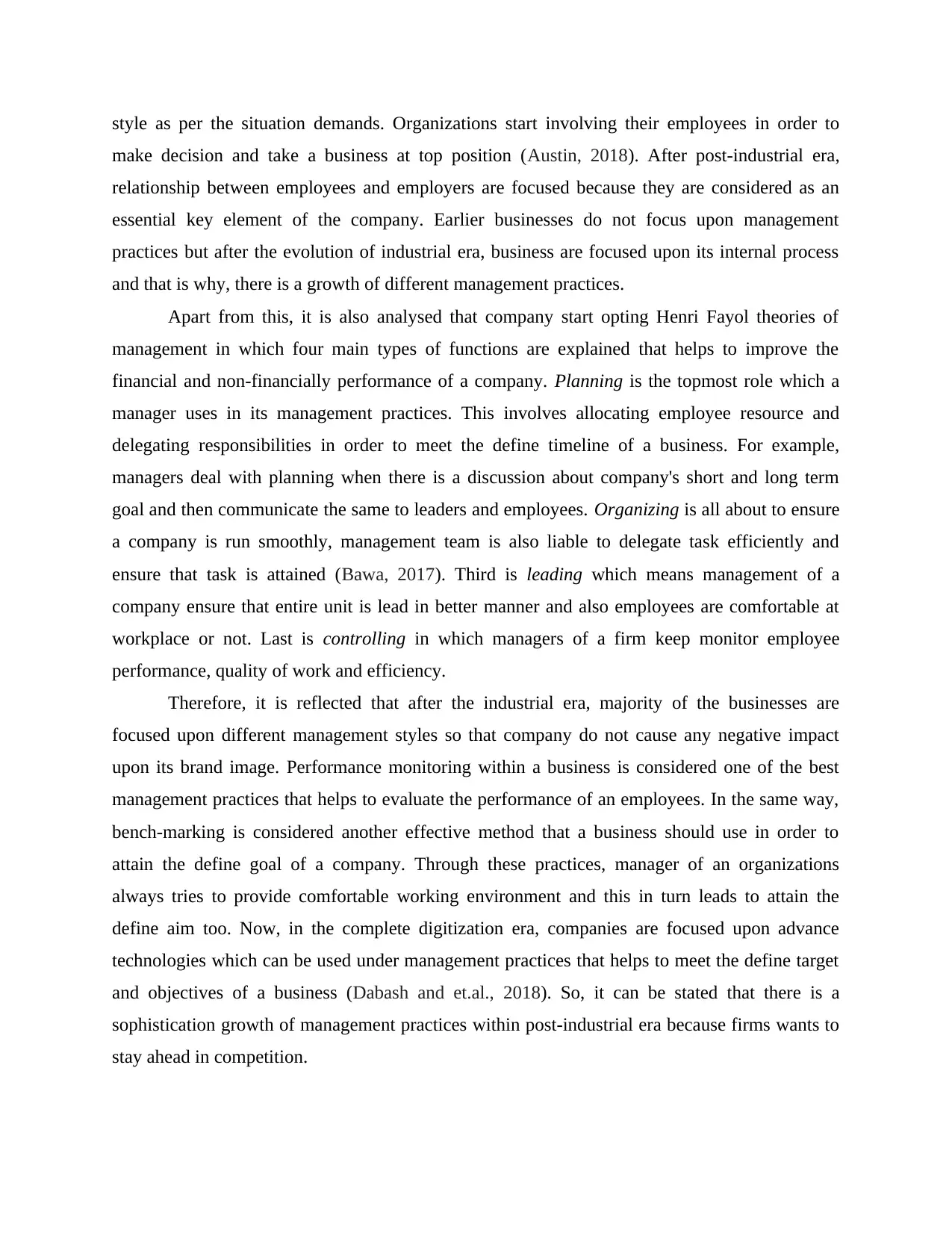
style as per the situation demands. Organizations start involving their employees in order to
make decision and take a business at top position (Austin, 2018). After post-industrial era,
relationship between employees and employers are focused because they are considered as an
essential key element of the company. Earlier businesses do not focus upon management
practices but after the evolution of industrial era, business are focused upon its internal process
and that is why, there is a growth of different management practices.
Apart from this, it is also analysed that company start opting Henri Fayol theories of
management in which four main types of functions are explained that helps to improve the
financial and non-financially performance of a company. Planning is the topmost role which a
manager uses in its management practices. This involves allocating employee resource and
delegating responsibilities in order to meet the define timeline of a business. For example,
managers deal with planning when there is a discussion about company's short and long term
goal and then communicate the same to leaders and employees. Organizing is all about to ensure
a company is run smoothly, management team is also liable to delegate task efficiently and
ensure that task is attained (Bawa, 2017). Third is leading which means management of a
company ensure that entire unit is lead in better manner and also employees are comfortable at
workplace or not. Last is controlling in which managers of a firm keep monitor employee
performance, quality of work and efficiency.
Therefore, it is reflected that after the industrial era, majority of the businesses are
focused upon different management styles so that company do not cause any negative impact
upon its brand image. Performance monitoring within a business is considered one of the best
management practices that helps to evaluate the performance of an employees. In the same way,
bench-marking is considered another effective method that a business should use in order to
attain the define goal of a company. Through these practices, manager of an organizations
always tries to provide comfortable working environment and this in turn leads to attain the
define aim too. Now, in the complete digitization era, companies are focused upon advance
technologies which can be used under management practices that helps to meet the define target
and objectives of a business (Dabash and et.al., 2018). So, it can be stated that there is a
sophistication growth of management practices within post-industrial era because firms wants to
stay ahead in competition.
make decision and take a business at top position (Austin, 2018). After post-industrial era,
relationship between employees and employers are focused because they are considered as an
essential key element of the company. Earlier businesses do not focus upon management
practices but after the evolution of industrial era, business are focused upon its internal process
and that is why, there is a growth of different management practices.
Apart from this, it is also analysed that company start opting Henri Fayol theories of
management in which four main types of functions are explained that helps to improve the
financial and non-financially performance of a company. Planning is the topmost role which a
manager uses in its management practices. This involves allocating employee resource and
delegating responsibilities in order to meet the define timeline of a business. For example,
managers deal with planning when there is a discussion about company's short and long term
goal and then communicate the same to leaders and employees. Organizing is all about to ensure
a company is run smoothly, management team is also liable to delegate task efficiently and
ensure that task is attained (Bawa, 2017). Third is leading which means management of a
company ensure that entire unit is lead in better manner and also employees are comfortable at
workplace or not. Last is controlling in which managers of a firm keep monitor employee
performance, quality of work and efficiency.
Therefore, it is reflected that after the industrial era, majority of the businesses are
focused upon different management styles so that company do not cause any negative impact
upon its brand image. Performance monitoring within a business is considered one of the best
management practices that helps to evaluate the performance of an employees. In the same way,
bench-marking is considered another effective method that a business should use in order to
attain the define goal of a company. Through these practices, manager of an organizations
always tries to provide comfortable working environment and this in turn leads to attain the
define aim too. Now, in the complete digitization era, companies are focused upon advance
technologies which can be used under management practices that helps to meet the define target
and objectives of a business (Dabash and et.al., 2018). So, it can be stated that there is a
sophistication growth of management practices within post-industrial era because firms wants to
stay ahead in competition.
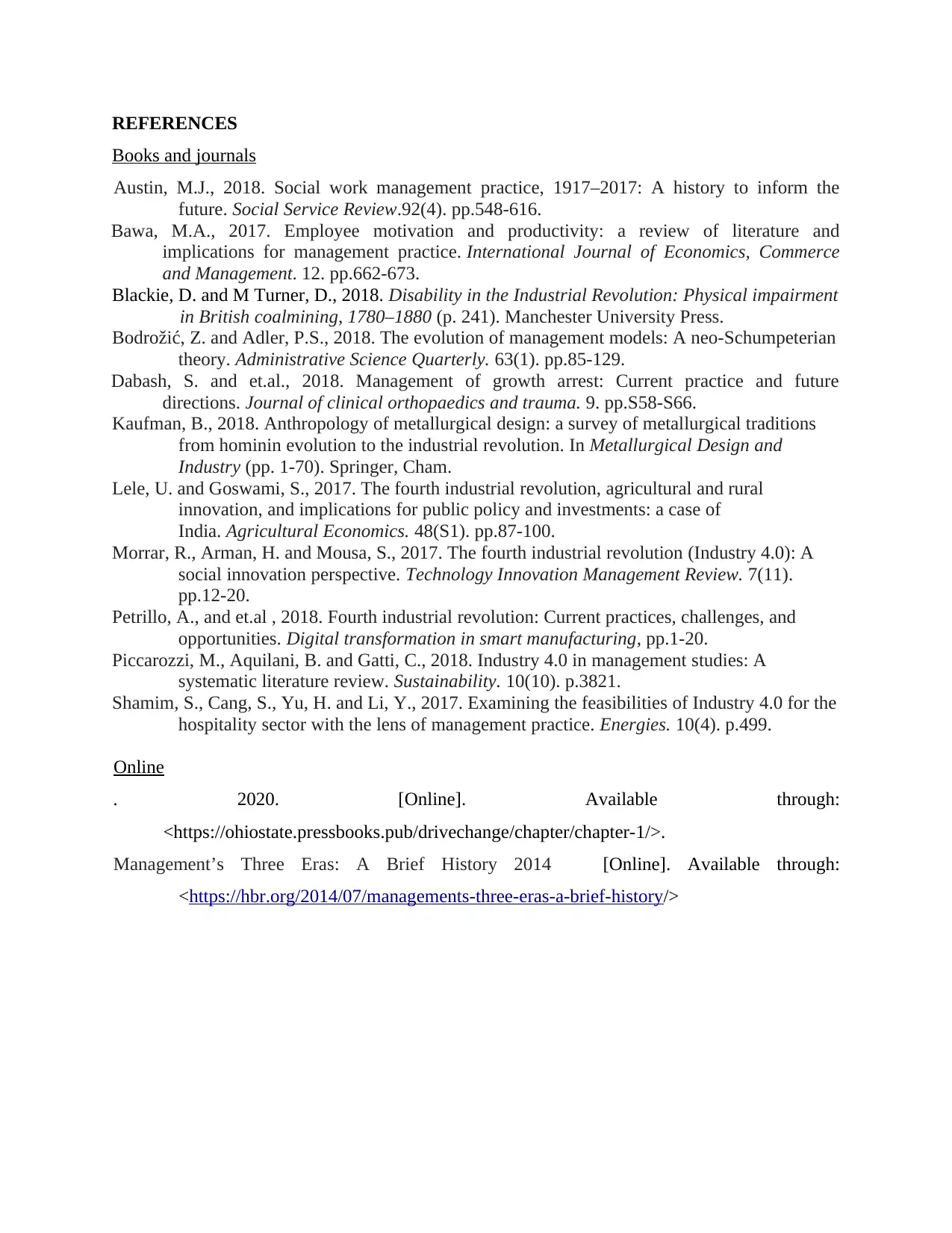
REFERENCES
Books and journals
Austin, M.J., 2018. Social work management practice, 1917–2017: A history to inform the
future. Social Service Review.92(4). pp.548-616.
Bawa, M.A., 2017. Employee motivation and productivity: a review of literature and
implications for management practice. International Journal of Economics, Commerce
and Management. 12. pp.662-673.
Blackie, D. and M Turner, D., 2018. Disability in the Industrial Revolution: Physical impairment
in British coalmining, 1780–1880 (p. 241). Manchester University Press.
Bodrožić, Z. and Adler, P.S., 2018. The evolution of management models: A neo-Schumpeterian
theory. Administrative Science Quarterly. 63(1). pp.85-129.
Dabash, S. and et.al., 2018. Management of growth arrest: Current practice and future
directions. Journal of clinical orthopaedics and trauma. 9. pp.S58-S66.
Kaufman, B., 2018. Anthropology of metallurgical design: a survey of metallurgical traditions
from hominin evolution to the industrial revolution. In Metallurgical Design and
Industry (pp. 1-70). Springer, Cham.
Lele, U. and Goswami, S., 2017. The fourth industrial revolution, agricultural and rural
innovation, and implications for public policy and investments: a case of
India. Agricultural Economics. 48(S1). pp.87-100.
Morrar, R., Arman, H. and Mousa, S., 2017. The fourth industrial revolution (Industry 4.0): A
social innovation perspective. Technology Innovation Management Review. 7(11).
pp.12-20.
Petrillo, A., and et.al , 2018. Fourth industrial revolution: Current practices, challenges, and
opportunities. Digital transformation in smart manufacturing, pp.1-20.
Piccarozzi, M., Aquilani, B. and Gatti, C., 2018. Industry 4.0 in management studies: A
systematic literature review. Sustainability. 10(10). p.3821.
Shamim, S., Cang, S., Yu, H. and Li, Y., 2017. Examining the feasibilities of Industry 4.0 for the
hospitality sector with the lens of management practice. Energies. 10(4). p.499.
Online
. 2020. [Online]. Available through:
<https://ohiostate.pressbooks.pub/drivechange/chapter/chapter-1/>.
Management’s Three Eras: A Brief History 2014 [Online]. Available through:
<https://hbr.org/2014/07/managements-three-eras-a-brief-history/>
Books and journals
Austin, M.J., 2018. Social work management practice, 1917–2017: A history to inform the
future. Social Service Review.92(4). pp.548-616.
Bawa, M.A., 2017. Employee motivation and productivity: a review of literature and
implications for management practice. International Journal of Economics, Commerce
and Management. 12. pp.662-673.
Blackie, D. and M Turner, D., 2018. Disability in the Industrial Revolution: Physical impairment
in British coalmining, 1780–1880 (p. 241). Manchester University Press.
Bodrožić, Z. and Adler, P.S., 2018. The evolution of management models: A neo-Schumpeterian
theory. Administrative Science Quarterly. 63(1). pp.85-129.
Dabash, S. and et.al., 2018. Management of growth arrest: Current practice and future
directions. Journal of clinical orthopaedics and trauma. 9. pp.S58-S66.
Kaufman, B., 2018. Anthropology of metallurgical design: a survey of metallurgical traditions
from hominin evolution to the industrial revolution. In Metallurgical Design and
Industry (pp. 1-70). Springer, Cham.
Lele, U. and Goswami, S., 2017. The fourth industrial revolution, agricultural and rural
innovation, and implications for public policy and investments: a case of
India. Agricultural Economics. 48(S1). pp.87-100.
Morrar, R., Arman, H. and Mousa, S., 2017. The fourth industrial revolution (Industry 4.0): A
social innovation perspective. Technology Innovation Management Review. 7(11).
pp.12-20.
Petrillo, A., and et.al , 2018. Fourth industrial revolution: Current practices, challenges, and
opportunities. Digital transformation in smart manufacturing, pp.1-20.
Piccarozzi, M., Aquilani, B. and Gatti, C., 2018. Industry 4.0 in management studies: A
systematic literature review. Sustainability. 10(10). p.3821.
Shamim, S., Cang, S., Yu, H. and Li, Y., 2017. Examining the feasibilities of Industry 4.0 for the
hospitality sector with the lens of management practice. Energies. 10(4). p.499.
Online
. 2020. [Online]. Available through:
<https://ohiostate.pressbooks.pub/drivechange/chapter/chapter-1/>.
Management’s Three Eras: A Brief History 2014 [Online]. Available through:
<https://hbr.org/2014/07/managements-three-eras-a-brief-history/>
⊘ This is a preview!⊘
Do you want full access?
Subscribe today to unlock all pages.

Trusted by 1+ million students worldwide
1 out of 9
Related Documents
Your All-in-One AI-Powered Toolkit for Academic Success.
+13062052269
info@desklib.com
Available 24*7 on WhatsApp / Email
![[object Object]](/_next/static/media/star-bottom.7253800d.svg)
Unlock your academic potential
Copyright © 2020–2026 A2Z Services. All Rights Reserved. Developed and managed by ZUCOL.





